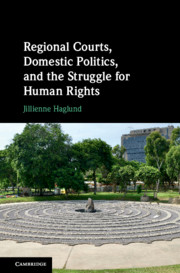Book contents
- Frontmatter
- Dedication
- Contents
- List of Figures
- List of Tables
- Acknowledgements
- 1 Introduction
- 2 Explaining Regional Human Rights Court Deterrence
- 3 Examining Patterns of General Regional Court Deterrence
- 4 Does the Executive have the Capacity to Respond to Adverse Judgments?
- 5 Is the Executive Willing to Respond to Adverse Judgments? The Role of Mass Public Pressure
- 6 Is the Executive Willing to Respond to Adverse Judgments? The Role of Elite Pressure
- 7 Amplified Regional Court Deterrence: High Executive Capacity and High Executive Willingness
- 8 Conclusion
- Appendix A Chapter 3 Appendix
- Appendix B Chapter 4 Appendix
- Appendix C Chapter 5 Appendix
- Appendix D Chapter 6 Appendix
- Appendix E Chapter 7 Appendix
- References
- Index
7 - Amplified Regional Court Deterrence: High Executive Capacity and High Executive Willingness
Published online by Cambridge University Press: 01 June 2020
- Frontmatter
- Dedication
- Contents
- List of Figures
- List of Tables
- Acknowledgements
- 1 Introduction
- 2 Explaining Regional Human Rights Court Deterrence
- 3 Examining Patterns of General Regional Court Deterrence
- 4 Does the Executive have the Capacity to Respond to Adverse Judgments?
- 5 Is the Executive Willing to Respond to Adverse Judgments? The Role of Mass Public Pressure
- 6 Is the Executive Willing to Respond to Adverse Judgments? The Role of Elite Pressure
- 7 Amplified Regional Court Deterrence: High Executive Capacity and High Executive Willingness
- 8 Conclusion
- Appendix A Chapter 3 Appendix
- Appendix B Chapter 4 Appendix
- Appendix C Chapter 5 Appendix
- Appendix D Chapter 6 Appendix
- Appendix E Chapter 7 Appendix
- References
- Index
Summary
In this final empirical chapter, I show that executive capacity and willingness complement one another in generating executive human rights policy change following adverse regional human rights court judgment. I show that following an adverse European Court judgment, in the face of mass public pressure, executive human rights policy change is likely regardless of the level of executive capacity. However, high-capacity European executives are more willing to engage in human rights policy change as a result of economic elite pressure than low-capacity European executives. With respect to the Americas, I show that executives are more likely to engage in human rights policy change following an adverse Inter-American Court judgment when the executive is highly willing as a result of mass public and political elite pressure, and this effect grows in the presence of high executive capacity. Similarly, following an adverse Inter-American Court judgment, highly capable executives are more likely to make human rights policy changes when the executive is highly willing as opposed to unwilling.
Keywords
- Type
- Chapter
- Information
- Publisher: Cambridge University PressPrint publication year: 2020

